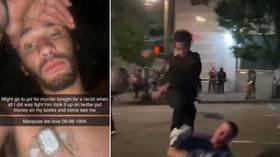Take that, Trump - or Antifa! Dueling narratives over appeals court’s partial rollback of anti-riot law
A 1968 law the Trump administration has used to prosecute people involved in the past months’ rioting has been partially rolled back as a federal appeals court realized - 52 years later - some of its parts were unconstitutional.
The 4th Circuit Court of Appeals has nixed a portion of the 1968 Anti-Riot Act that criminalized “encouraging,” “promoting,” or “urging” a riot, arguing it infringed on First Amendment free speech protections in a Monday decision. However, “organizing” or “inciting” a riot remains a crime, as does crossing state lines to participate in rioting.
Monday’s case concerned two California men who admitted to having “personally committed multiple violent acts” during the 2017 Unite the Right rally in Charlottesville - meaning the nullification of the ‘free speech’ portion wasn’t relevant to their fate. However, supporters and critics of President Donald Trump seized on the decision’s implications for the Justice Department’s prosecution of Antifa and other “far left extremist groups” allegedly responsible for the rioting that has erupted in cities across the country in the wake of the killing of George Floyd by Minneapolis police.
Also on rt.com Trump says federal agents will ‘solve problem fast’ if mayors of Dem-run cities ask for help with 'antigovernment' riotsAttorney General William Barr warned rioters back in May that he planned to use the 1968 law to prosecute those who came from out of state to riot, claiming the violence in cities like Minneapolis and Chicago was “planned, organized, and driven by far left extremist groups and anarchic groups using Antifa-like tactics.”
While the 4th Circuit’s decision may impinge somewhat on the Justice Department’s ability to charge rioters, it’s an improvement - at least, for the Trump administration - over a 2019 decision that deemed the entire Anti-Riot Act unconstitutional for the same First Amendment reasons. Back then, it concerned another Charlottesville-related case - against three alleged members of far-right group Rise Above Movement. They hadn’t even traveled to Charlottesville but merely posted supposedly inciting material. The case - and the law - were thrown out, though prosecutors have appealed the ruling.
Also on rt.com WATCH Antifa clash with Proud Boys in Portland, as police refuse to declare a riot & let violent brawls ‘resolve themselves’Politico appeared to view the decision as a victory, noting the convictions of the two Charlottesville attendees had been upheld and the Justice Department was deprived of an unconstitutional tool for charging riot cheerleaders .
However, conservative provocateur Mike Cernovich hailed the decision as “bad news for Antifa,” viewing the decision’s affirmation of crossing state lines to riot being a crime as a victory.
This is bad news for ANTIFA. REALLY BAD NEWS https://t.co/Im1gYbwIK1
— Cernovich (@Cernovich) August 24, 2020
The Trump administration announced its crackdown on Antifa and “far left extremists” in the days following Floyd’s killing as rioters laid waste to Minneapolis and other cities and have in some cases sent in federal troops. Over the weekend, Portland police declined to intervene in a mass brawl between Antifa and Proud Boys or even declare the melee a riot, citing a lack of crowd-control resources and over two months of “violent actions” against police.
The county District Attorney’s apparent refusal to charge protesters with low-level offenses may also have been a factor in the officers’ hands-off approach. Oregon state police left Portland earlier this month after making a similar complaint, noting that of over 500 people arrested, just 50 had been charged. While federal troops were also dispatched to the city for several weeks to protect its courthouse, they also withdrew earlier this month amid a media uproar over dubiously legal tactics, including grabbing protesters off the street in unmarked vans.
Like this story? Share it with a friend!













